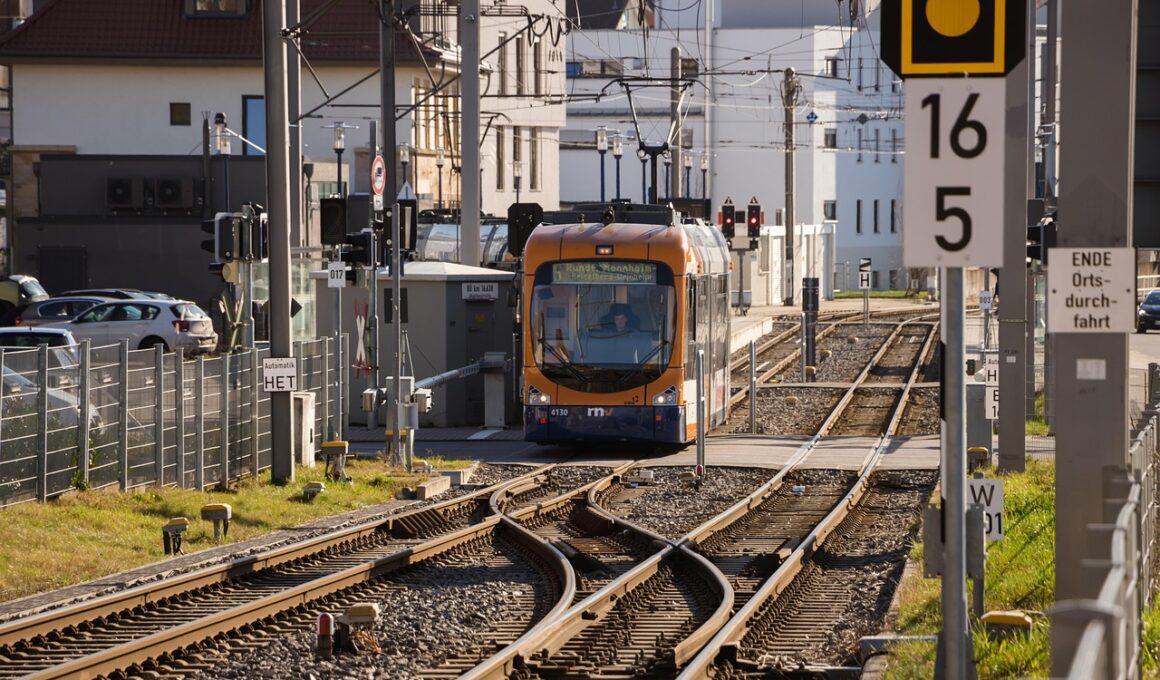The Effects of Climate Change on Urban Economic Planning
Climate change significantly impacts urban economic planning by altering environmental risks and economic dynamics. Cities are already witnessing increased flooding, heatwaves, and unpredictable weather patterns, which can affect infrastructure and housing markets. Urban planners must incorporate sustainability into their frameworks to mitigate these risks effectively. For example, green infrastructure not only combats stormwater runoff but can also enhance property values. To adapt, cities might transition to more sustainable energy sources, which can create jobs and drive local economies. Urban areas could also benefit from increased public transport investments, which can lower emissions while improving accessibility. Adapting plans may require collaboration between public and private sectors to implement effective policies. Measures like zoning ordinances and building codes must evolve to consider climate resilience. Cities may employ historical data and predictive models to guide these changes. Engaging community stakeholders ensures plans meet the needs of diverse populations. Planning for climate change requires forward-thinking and flexibility. Ultimately, successful urban economic planning will depend on integrating climate change mitigation strategies to protect both our environment and economies.
As climate-related challenges become more prevalent, urban economic planners must prioritize resilient infrastructure investments. This necessity translates into substantial changes in capital allocation and local governance frameworks. Cities can adopt various measures, such as enhancing drainage systems or reinforcing coastal barriers, to prepare for increasingly severe weather events. Economic implications extend beyond immediate structural adaptations; they include long-term adjustments to land use and property values. Vibrant local economies depend on stability and viability of infrastructure. Public-private partnerships can play a vital role in funding these initiatives, ensuring a blend of resources for maximum impact. Moreover, integrating technology plays a crucial role in these investments. Smart cities leveraging technology can enhance efficiency in resource management and provide data for informed decision-making. Having robust systems in place can lead to reduced economic losses in the wake of climate disasters. Planners might also consider integrating natural systems into urban designs for added resilience. Communities that embrace these innovative approaches adapt quicker to climate change-induced stresses. Ultimately, sustainability must be at the forefront of every economic planning strategy to ensure cities can thrive in a changing environmental landscape.
Economic Diversification in Response to Climate Change
To effectively cope with the economic impacts of climate change, urban economies should focus on diversification strategies. Greater diversification can bolster resilience by spreading economic risk across various sectors. As traditional industries face climate-related disruptions, emerging sectors like renewable energy and sustainable agriculture present opportunities for growth. Policymakers should encourage investments in these sectors by offering incentives and support to startups and existing businesses. Urban centers can leverage their unique geographic advantages while creating job opportunities within these emerging fields. However, careful consideration must be given to workforce reskilling initiatives. As industries shift, employees may need retraining to develop skills suited for the green economy. Collaboration with educational institutions can foster this transition effectively. Thus, urban planning can align labor market needs with educational programs, ensuring a smooth transition for workers. Additionally, fostering partnerships between different sectors can promote innovative solutions to climate challenges. Engaging businesses in sustainability initiatives enhances community support and facilitates resource sharing. Diversification can enhance economic stability and empower cities to address climate change effectively. A proactive approach focusing on adaptation strategies is essential for long-term urban success amid climate uncertainties.
Environmental justice plays a crucial role in urban economic planning in the context of climate change. Vulnerable populations often bear the brunt of climate impacts, exacerbating existing inequalities. As cities plan for climate resilience, addressing the needs of disadvantaged communities must be a priority. This involves creating equitable access to resources and opportunities for those most impacted by climate risks. Urban planners should prioritize green spaces and affordable housing in low-income neighborhoods, enhancing both environmental quality and community well-being. Moreover, gathering data on how climate change affects different demographics can help tailor strategies effectively. Engaging these communities in policymaking ensures that their voices are heard, fostering trust and collaboration. Initiatives incorporating public participation can lead to customized solutions that resonate more deeply with residents. When communities feel included in decision-making processes, it leads to better compliance with adaptation measures. Consequently, efforts to combat climate change can become a powerful tool for promoting social equity. Building resilient urban economies necessitates that equitable solutions are at the forefront of planning strategies. Achieving balance is crucial for a sustainable future that addresses climate challenges head-on.
Sustainable Financing for Climate Resilience
A critical aspect of addressing climate change through urban economic planning is the establishment of sustainable financing mechanisms. Cities require significant resources to implement climate-resilient infrastructure and adapt practices effectively. Innovative financing solutions, such as green bonds and climate adaptation funds, can provide necessary capital for projects. Engaging private investors and financial institutions is key for these sustainable financing models. Partnerships can catalyze funding and facilitate the development of environmentally friendly initiatives. Furthermore, cities can enhance revenue generation through local taxes dedicated to environmental projects, ensuring a continuous funding stream. Public funding alone will likely be insufficient to address the growing challenges posed by climate change. Thus, city leaders must cultivate relationships with stakeholders across sectors, encouraging collaborative resource mobilization. Long-term strategies should incorporate risk assessments that determine the most efficient allocation of funds, enhancing the return on investment. Incorporating technologies for monitoring and evaluating project performances can also strengthen funding transparency. Ultimately, securing adequate financing is essential to prioritize climate-resilient initiatives in urban economic planning. Without it, cities risk long-term sustainability and economic vitality in the face of climate change.
Urban economic planning must also enhance opportunities for sustainable transportation to combat climate change effectively. Public transport systems significantly influence urban mobility and emissions reduction. Affordable, efficient, and well-designed transportation networks encourage residents to choose lower-emission alternatives. As cities expand, planners should prioritize investments in public transit infrastructure and cycling networks. These improvements can reduce traffic congestion, lowering greenhouse gas emissions and air pollution levels. Walkability enhancements, including pedestrian-friendly streets and green areas, further promote sustainable urban lifestyles. Responsible urban planning extends beyond merely providing transportation options; it necessitates integrating them with land use to promote compact, mixed-use development. By reducing reliance on personal vehicles, cities foster a more connected urban environment. Moreover, promoting electric vehicle infrastructure, such as charging stations, can help accelerate the transition to sustainable transport. Engaging communities in the planning process fosters support for green initiatives and encourages behavior changes. Ultimately, effective transportation solutions must play a vital role in urban economic planning, ensuring cities can transition towards sustainability while accommodating the needs of their inhabitants.
Conclusion: Future Directions in Urban Economic Planning
The changing dynamics stemming from climate change necessitate a reevaluation of urban economic planning approaches. Cities must not only adapt to existing challenges but should also anticipate future demands. Continuing to innovate and prioritize sustainability is paramount in achieving resilience against climate change. Effective strategies will require an understanding of intricate interdependencies between urban infrastructure, economic growth, and social equity. By considering these factors, urban planners can cultivate environments that are both economically viable and ecologically sustainable. Policymakers should also emphasize interdisciplinary collaboration, integrating knowledge across sectors to inform planning strategies. Engaging citizens is equally important, fostering community ownership of sustainability initiatives. Sustainable urban development can only be realized through concerted efforts that unite residents, governments, and businesses. Additionally, long-term planning horizons will enhance adaptability, enabling strategies to evolve with emerging climate realities. The future of urban economic planning hinges on the commitment to inclusivity and innovation. A forward-thinking approach will empower cities to not only survive climate change but also contribute to a thriving global response. Ultimately, the holistic approach ensures that urban areas can flourish sustainably amid these pressing challenges.
In conclusion, addressing climate change’s impacts on urban economic planning demands a multifaceted approach. Appropriate strategies must integrate sustainability, equity, and innovation to ensure long-term resilience. Traditional planning practices must adapt to incorporate the unpredictable nature of climate change. The successful implementation of these strategies hinges on collaboration among stakeholders, innovative financing, and thoughtful community engagement. Cities must embrace this transformation to build inclusive and sustainable urban environments, prepared for the unpredictable future ahead. Sustainable finance solutions, diversified economies, and effective infrastructure investments will empower urban centers to face climate-related challenges confidently. Each city’s unique challenges provide an opportunity to harness local knowledge and creativity. This journey towards resiliency presents an opportunity for communities to innovate and thrive, as they devise solutions tailored to their specific contexts. Only with a unified effort can we combat the extensive effects of climate change while fostering urban prosperity. Ultimately, urban economic planning must evolve continuously, responding to challenges proactively. This adaptability will ensure that cities remain vibrant, equitable, and resilient in the face of escalating climate threats.





